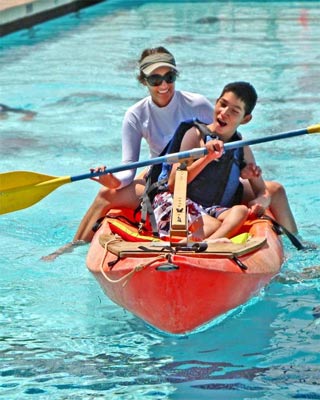Sports Camp for Kids in Wheelchairs
Everything From Basketball to Climbing Walls
“Wheelchair” and “independence” are words that many people are hesitant to use in the same sentence, but at the Junior Wheelchair Sports Camp, there is nothing but certainty that the two belong together. At the annual summer camp, kids ages five through 19 are offered the use of unique chairs, equipment, and assistance to play and be active with other kids in wheelchairs. The five day camp-it took place from July 14 through 18 this year-handicapped youth are given an opportunity to experience sports and life in a new way.
Sponsored by the Cottage Rehabilitations Hospital, the Rehabilitation Hospital Foundation, and the University of California at Santa Barbara Recreation Department, the camp is free for those who qualify. Transportation is free, and lunch is donated by various companies who support the cause. The camp also has a nurse to administer medication and attend to other needs, which allows parents to leave their kids at the camp to have a more independent experience. There are over 70 volunteers from high schools, colleges, and a wide range of organizations to assist the campers and ensure they are safe and comfortable. With UC Santa Barbara’s Recreation Center as the venue, a wide range of sports settings are available, allowing for a large variety of activities including basketball, swimming, tennis, quad rugby, wall climbing, handcycle, kayaking, scuba, and dance.

However, the camp is not only aimed at sports. “We try to provide inspirational as well as physical activity,” said Herb Tews, vice chairman of the Rehabilitation Hospital Foundation. Many of the camp counselors and volunteers are in wheelchairs themselves, and serve as mentors for the younger campers. Some of the attendees have been coming to the camp since they were five or six, and are now counselors. “People continue to come back, the camp holds lots of longevity,” said Rene Van Hoorn, co-director of the camp, “but there are always new campers.”
The kids also develop socially. As in any other summer camp for kids, friendships form, and campers come out of their shells more throughout the week. They are divided into five groups based on age and ability. Each group has a group name and camp cheer. They are also assigned a color, around which the group name is developed, such as the “Tangerine Tigers” and the “Green Ninja Frogs.”
The program gives physically disabled youths a change to feel accomplished, explained Van Hoorne, and to be unafraid to get “right in there with everybody else.” They cheer for each other, and the camp becomes a safe place for the kids to be themselves. “There are very few opportunities for specialized programs like this one,” said Rene, “because this is a specialty camp, kids have a chance for someone to be patient with them.”
The reverse is also true. When asked about his experience at the Junior Wheelchair Sports Camp, one boy explained that the camp and counselors “teach you patience.” His fellow campers chimed in with enthusiastic descriptions of camp as “fun,” “awesome,” and “cool.”
While the attendees of this camp are physically disabled as the result of conditions such as cerebral palsy, muscular dystrophy, and spinal injuries, they are still enjoying a summer camp experience as children not as victims of disabilities. “They’re just kids,” said volunteer Libby Whaley, “it’s important to remember that they’re just kids.”



